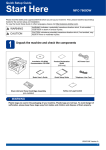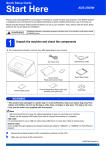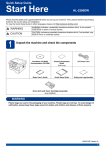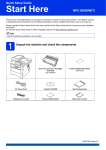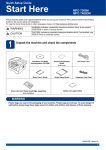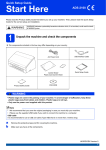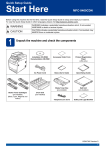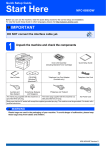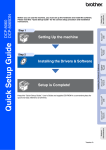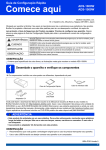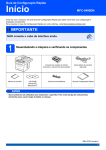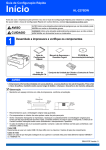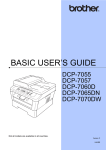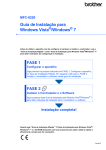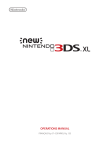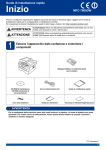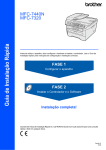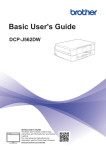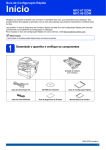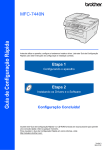Download - Brother
Transcript
Quick Setup Guide
Start Here
MFC-7860DW
Please read the Safety and Legal booklet first before you set up your machine. Then, please read this Quick Setup
Guide for the correct setup and installation.
To view the Quick Setup Guide in other languages, please visit http://solutions.brother.com/.
WARNING
WARNING indicates a potentially hazardous situation which, if not avoided,
could result in death or serious injuries.
CAUTION
CAUTION indicates a potentially hazardous situation which, if not avoided, may
result in minor or moderate injuries.
1
Unpack the machine and check the components
Drum Unit and Toner Cartridge Assembly
(pre-installed)
Installation CD-ROM,
Documentation CD-ROM
(For U.K.)
(For Others)
Telephone Line Cord
AC Power Cord
Quick Setup Guide
Basic User’s Guide
Safety and Legal booklet
WARNING
Plastic bags are used in the packaging of your machine. Plastic bags are not toys. To avoid danger of
suffocation, please keep these bags away from babies and children and dispose of them correctly.
UK/IRE/SAF Version 0
1
CAUTION
CAUTION
When you move the machine, grasp the side handholds that are under the scanner. DO NOT carry the machine
by holding it at the bottom.
Note
• Keep a minimum gap around the machine as shown in the illustration.
250 mm
90 mm
100 mm
100 mm
• The components included in the box may differ depending on your country.
• Please save the original packaging should you need to ship the machine in future.
• If for any reason you must ship your machine, carefully repack the machine in the original packaging to avoid
any damage during transit. The machine should be adequately insured with the carrier. For how to repack
the machine, see Packing and shipping the machine in the Advanced User's Guide.
• The interface cable is not a standard accessory. Buy the appropriate interface cable for the interface you
want to use (USB or Network).
USB cable
• It is recommended to use a USB 2.0 cable (Type A/B) that is no longer than 2 metres.
• DO NOT connect the interface cable at this time. Connecting the interface cable is done during the MFL-Pro
installation process.
Network cable
Use a straight-through Category5 (or greater) twisted-pair cable for 10BASE-T or 100BASE-TX Fast Ethernet
Network.
2
2
Remove the packing
material from the
machine
d
Lift the elastic band off the drum.
IMPORTANT
DO NOT connect the AC power cord yet.
a
b
Remove the packing tape from the outside of
the machine and the film covering the scanner
glass.
Open the front cover.
e
c
Pull the paper strip to remove the protective
material as shown in the illustration.
Remove the Silica Pack from the inside of the
machine.
f
Take out the drum unit and toner cartridge
assembly.
CAUTION
CAUTION
DO NOT eat the Silica Pack. Please discard.
If ingested seek medical attention immediately.
3
g
Gently shake it from side to side several times
to distribute the toner evenly inside the
assembly.
a
h
Pull the paper tray completely out of the
machine.
Put the drum unit and toner cartridge assembly
back in the machine.
b
i
3
Load paper in the paper
tray
While pressing the green paper-guide release
lever a, slide the paper guides to fit the paper
size you are loading in the tray. Make sure that
the guides are firmly in the slots.
Close the front cover of the machine.
1
4
c
4
Fan the stack of paper well to avoid paper jams
and misfeeds.
Connect the power cord
and telephone line
IMPORTANT
DO NOT connect the interface
cable yet.
d
Put paper in the tray and make sure:
The paper is below the maximum paper
mark (b b b) a.
Over filling the paper tray will cause paper
jams.
The side to be printed on must be face down.
The paper guides touch the sides of the
paper so it will feed correctly.
1
a
b
c
Connect the AC power cord to the machine,
and then plug it into an electrical socket.
Turn on the machine’s power switch.
Connect the telephone line cord. Connect one
end of the telephone line cord to the socket on
the machine marked LINE and the other end to
a telephone wall socket.
(Example for U.K.)
IMPORTANT
The telephone line cord MUST be connected
to the socket on the machine marked LINE.
WARNING
e
Put the paper tray firmly back in the machine.
Make sure that it is completely inserted into the
machine.
For more information about recommended
paper, see Recommended paper and print
media in the Basic User’s Guide.
The machine must be grounded using an
earthed plug.
Since the machine is grounded through the
electrical socket, you can protect yourself
from potentially hazardous electrical
conditions on the telephone network by
keeping the power cord connected to your
machine when you connect it to a telephone
line. Similarly, you can protect yourself when
you want to move your machine by
disconnecting the telephone line first and then
the power cord.
5
5
Note
If you are sharing one telephone line with an
external telephone, connect it as shown below.
1
Choose a Receive Mode
There are four possible receive modes: Fax Only,
Fax/Tel, Manual and External TAD.
Do you want to use the telephone features of your
machine (if available) or an external telephone or
external telephone answering device connected on the
same line as the machine?
2
(Example for U.K.)
Yes
1 Extension telephone
2 External telephone
No
Are you using the voice message
function of an external telephone
answering device?
Note
No
If you are sharing one telephone line with an
external telephone answering machine, connect it
as shown below.
Do you want the machine to
answer fax and telephone calls
automatically?
Fax Only
Your machine
automatically answers
every call as a fax.
Yes
Fax/Tel
Your machine controls
the line and
automatically answers
every call. If the call is
not a fax, the phone will
ring for you to pick up
the call.
(Example for U.K.)
Set the receive mode to External TAD if
you have an external answering machine.
See Choose a Receive Mode on page 6. For
additional details, see Connecting an
external TAD in the Basic User’s Guide.
No
Yes
Manual
You control the phone
line and must answer
every call yourself.
External TAD
Your external telephone
answering device (TAD)
automatically answers
every call. Voice
messages are stored
on the external TAD.
Fax messages are
automatically printed.
a
b
Press Menu, 0, 1.
Press a or b to choose the receive mode.
Press OK.
c
Press Stop/Exit.
For more details, see Using receive modes in
the Basic User's Guide.
6
6
Set the LCD contrast
(if needed)
If you are having difficulty reading the LCD, try
changing the contrast setting.
a
b
d
Date&Time
Day:25
(e.g. Enter 2, 5 for 25th.)
e
Press Menu, 1, 5.
—OR—
Press OK.
c
Enter the time in 24-hour format on the dial
pad, and then press OK.
Date&Time
Time:15:25
Press c to increase the contrast.
Press d to decrease the contrast.
Enter the two digits for the day on the dial pad,
and then press OK.
(e.g. Enter 1, 5, 2, 5 for 3:25 P.M.)
f
Press Stop/Exit.
Press Stop/Exit.
7
Set the date and time
The machine displays the time, and if you set up the
station ID the date and time will be added to each fax
you send.
a
b
Press Menu, 0, 2, 1.
Enter the last two digits of the year on the dial
pad, and then press OK.
Date&Time
Year:2011
(e.g. Enter 1, 1 for 2011.)
c
Enter the two digits for the month on the dial
pad, and then press OK.
Date&Time
Month:03
(e.g. Enter 0, 3 for March.)
7
8
Enter personal
information (station ID)
One
time
Two
times
Three
times
Four
times
Five
times
2
A
B
C
2
A
3
D
E
F
3
D
The machine displays the date and time, and if you
set up the station ID, it will add it to each fax you send.
4
G
H
I
4
G
5
J
K
L
5
J
a
b
6
M
N
O
6
M
7
P
Q
R
S
7
8
T
U
V
8
T
9
W
X
Y
Z
9
c
d
Press Menu, 0, 3.
Enter your fax number (up to 20 digits) on the
dial pad, and then press OK.
Station ID
Fax:
Enter your telephone number (up to 20 digits)
on the dial pad, and then press OK. If your
telephone number and fax number are the
same, enter the same number again.
Station ID
Tel:
Use the dial pad to enter your name (up to
20 characters), and then press OK.
Station ID
Name:
Note
• See the following chart for entering your name.
• If you need to enter a character that is on the
same key as the last character, press c to move
the cursor to the right.
• If you entered a letter incorrectly and want to
change it, press d or c to move the cursor to the
incorrect character, press Clear.
8
Press
key
For more details, see Entering text in the
Basic User’s Guide.
e
Press Stop/Exit.
Note
If you make a mistake and want to start again,
press Stop/Exit and go back to step a.
9
Fax Transmission Report
Your Brother machine is equipped with a
Transmission Verification Report that can be used as
confirmation that you sent a fax. This report lists the
name or fax number of the receiving party, the date,
time, and duration of the transmission, the number of
pages transmitted, and whether or not the
transmission was successful. If you want to use the
Fax Transmission Report feature see Printing reports
in the Advanced User's Guide.
10
Set tone or pulse dialling
mode
c
Your machine comes set for Tone dialling service. If
you have Pulse dialling service (rotary), you need to
change the dialling mode.
a
b
Press Menu, 0, 4.
Press a or b to choose Pulse (or Tone).
Note
The default setting is “!”. When you press Tel/R,
“!” will be displayed on the LCD.
d
Press OK.
c
• You can use the number 0 to 9, #, l and !.
(Press Tel/R to display “!”.)
• You cannot use ! with any other numbers or
characters.
Set the telephone line
compatibility
If you are connecting the machine to a VoIP service
(over the Internet) you need to change the
compatibility setting.
• If your telephone system requires a timed break
recall, press Tel/R to enter the break.
e
• If you choose On, pressing Tel/R (the screen
displays “!”) will let you access an outside line.
If you are using an analogue telephone line you
can skip this step.
Press Menu, 2, 0, 1.
Press a or b to choose Basic(for VoIP).
Press OK.
c
Press Stop/Exit.
12
Set the telephone line
type
If you are connecting the machine to a line that
features a PABX (PBX) or ISDN to send and receive
faxes, it is also necessary to change the phone line
type accordingly by completing the following steps.
a
b
Press a or b to choose On or Always and press
OK.
Note
Note
a
b
Press Clear to delete the default setting, then
enter the prefix number (up to 5 digits) on the
dial pad, and then press OK.
Note
Press Stop/Exit.
11
Do one of the following:
If you want to change the current prefix
number, press 1 and go to step d.
If you do not want to change the current
prefix number, press 2 and go to step f.
• If you choose Always, you can access an
outside line without pressing Tel/R.
f
Press Stop/Exit.
Note
PBX and TRANSFER
The machine is initially set to Normal, which lets
the machine connect to a standard PSTN (Public
Switched Telephone Network) line. However,
many offices use a central telephone system or
Private Automatic Branch Exchange (PABX).
Your machine can be connected to most types of
PABX (PBX). The machine’s recall feature
supports timed break recall only (TBR). TBR will
work with most PABX (PBX) systems allowing
you to gain access to an outside line, or transfer
calls to another extension. The feature works
when Tel/R is pressed.
Press Menu, 0, 6.
Press a or b to choose PBX, ISDN or Normal.
Press OK.
Do one of the following:
If you choose ISDN or Normal, go to step f.
If you choose PBX, go to step c.
9
13
Automatic Daylight
Savings Time
You can set the machine to change automatically for
daylight savings time. It will reset itself forward one
hour in the Spring and backward one hour in the
Autumn.
a
b
Press Menu, 0, 2, 2.
Press a or b to choose On (or Off).
Press OK.
c
10
Press Stop/Exit.
14
Choose your connection type
These installation instructions are for Windows® 2000 Professional, Windows® XP Home/Windows® XP
Professional, Windows® XP Professional x64 Edition, Windows Vista®, Windows® 7, and Mac OS X (versions
10.4.11, 10.5.x and 10.6.x).
Note
For Windows Server® 2003/2003 x64 Edition/2008/2008 R2, visit your model page at
http://solutions.brother.com/.
Windows®
Macintosh
11
Macintosh
Note
You can download the latest drivers and utilities for your machine from the Brother Solutions Center at
http://solutions.brother.com/.
Windows®
Windows® and Macintosh,
go to page 21
Wireless Network
For Wireless Network
Macintosh
Windows®, go to page 16
Macintosh, go to page 19
Wired Network
For Wired Network
USB
Windows®, go to page 12
Macintosh, go to page 14
Windows®
For USB Interface Users
USB
Windows®
For USB Interface Users
(Windows® 2000 Professional/XP/XP Professional x64 Edition/Windows Vista®/Windows® 7)
15
a
Before you install
Make sure that your computer is ON and you
are logged on with Administrator rights.
16
a
IMPORTANT
• If there are any programs running, close
them.
• The screens may differ depending on your
operating system.
Note
The installation CD-ROM includes ScanSoft™
PaperPort™ 12SE. This software supports
Windows® XP (SP3 or greater), XP Professional
x64 Edition (SP2 or greater), Windows Vista®
(SP2 or greater) and Windows® 7. Update to the
latest Windows® Service Pack before installing
MFL-Pro Suite. For Windows® 2000 (SP4 or
greater) users, when the ScanSoft™ PaperPort™
11SE download screen appears during the
installation of MFL-Pro Suite, follow the on-screen
instructions.
b
Turn off the machine and make sure the USB
interface cable is NOT connected to the
machine. If you have already connected the
cable, disconnect it.
Install MFL-Pro Suite
Put the installation CD-ROM into your
CD-ROM drive. If the model name screen
appears, choose your machine. If the language
screen appears, choose your language.
Note
If the Brother screen does not appear
automatically, go to My Computer (Computer),
double-click the CD-ROM icon, and then
double-click start.exe.
b
c
Click Initial Installation and then Install
MFL-Pro Suite.
Click Yes if you accept the license agreements.
Note
• If the installation does not continue
automatically, open the top menu again by
ejecting and then reinserting the CD-ROM or
double-click the start.exe program from the
root folder, and continue from step b to install
MFL-Pro Suite.
• For Windows Vista® and Windows® 7 users,
when the User Account Control screen
appears, click Allow or Yes.
• If you want to install the PS driver (BR-Script3
printer driver), choose Custom Install and then
follow the on-screen instructions.
d
12
Follow the on-screen instructions until this
screen appears.
USB
e
Windows®
Connect the USB cable to the USB connector
marked with the
symbol on your machine
and then connect the cable to your computer.
f
Turn the machine on, and follow the on-screen
instructions to complete setup.
DO NOT cancel any of the screens during the
installation. It may take a few seconds for all
screens to appear.
• For Windows Vista® and Windows® 7 users,
when the Windows Security screen appears,
select the check box and click Install to
complete the installation correctly.
• If an error message appears during the
software installation, run the
Installation Diagnostics located in
Start/All Programs/Brother/MFC-XXXX
(where MFC-XXXX is your model name).
Finish
The installation is now
complete.
Note
• Depending on your security settings, a
Windows Security or antivirus software window
may appear when using the machine or its
software. Please allow or permit the window to
continue.
• XML Paper Specification Printer Driver
The XML Paper Specification Printer Driver is
the most suitable driver for Windows Vista® and
Windows® 7 when printing from applications
that use the XML Paper Specification
documents. Please download the latest driver
by accessing the Brother Solutions Center at
http://solutions.brother.com/.
13
Macintosh
USB
Note
Windows®
IMPORTANT
USB
Macintosh
For USB Interface Users (Mac OS X 10.4.11 - 10.6.x)
15
a
Before you install
Make sure your machine is connected to the
power and your Macintosh is ON. You must be
logged on with Administrator rights.
IMPORTANT
16
a
b
Install MFL-Pro Suite
Put the installation CD-ROM into your
CD-ROM drive.
Double-click the Start Here OSX icon. Follow
the on-screen instructions.
For Mac OS X 10.4.10 users, upgrade to
Mac OS X 10.4.11 - 10.6.x. (For the latest
drivers and information on the Mac OS X you
are using, visit http://solutions.brother.com/.)
Note
If you want to install the PS driver (BR-Script3
printer driver), please go to the Brother Solutions
Center at http://solutions.brother.com/, click
Downloads on your model page and visit FAQ's
for setup instructions.
b
Connect the USB cable to the USB connector
Note
It may take a few minutes for installation to
complete.
c
marked with the
symbol on your machine
and then connect the cable to your Macintosh.
c
d
Follow the on-screen instructions until this
screen appears. Choose your machine from
the list, and then click OK.
When this screen appears, click Next.
Make sure your machine’s power switch is on.
The installation of MFL-Pro Suite is now
complete.
Go to step 17 on page 15.
14
USB
17
Macintosh
Download and install
Presto! PageManager
When Presto! PageManager is installed OCR
capability is added to Brother ControlCenter2. You
can easily scan, share and organize photos and
documents using Presto! PageManager.
On the Brother Support screen, click
Presto! PageManager and follow the on-screen
instructions.
Macintosh
15
Windows®
The installation is now
complete.
USB
Finish
Wired Network
Windows®
For Wired Network Interface Users
(Windows® 2000 Professional/XP/XP Professional x64 Edition/Windows Vista®/Windows® 7)
15
a
Before you install
c
Connect the network interface cable to the LAN
connector and then connect it to a free port on
your hub.
Make sure that your computer is ON and you
are logged on with Administrator rights.
IMPORTANT
• If there are any programs running, close
them.
• The screens may differ depending on your
operating system.
Note
• The installation CD-ROM includes ScanSoft™
PaperPort™ 12SE. This software supports
Windows® XP (SP3 or greater), XP
Professional x64 Edition (SP2 or greater),
Windows Vista® (SP2 or greater) and
Windows® 7. Update to the latest Windows®
Service Pack before installing MFL-Pro Suite.
For Windows® 2000 (SP4 or greater) users,
when the ScanSoft™ PaperPort™ 11SE
download screen appears during the installation
of MFL-Pro Suite, follow the on-screen
instructions.
• Disable all personal firewall software (other
than Windows® Firewall), anti-spyware or
antivirus applications for the duration of the
installation.
b
d
16
a
Install MFL-Pro Suite
Put the installation CD-ROM into your
CD-ROM drive. If the model name screen
appears, choose your machine. If the language
screen appears, choose your language.
Note
If the Brother screen does not appear
automatically, go to My Computer (Computer),
double-click the CD-ROM icon, and then
double-click start.exe.
b
Remove the protective cap from the LAN
connector marked with a
symbol.
c
16
Make sure your machine’s power switch is on.
Click Initial Installation and then Install
MFL-Pro Suite.
Click Yes if you accept the license agreements.
Wired Network
Note
• If the installation does not continue
automatically, open the top menu again by
ejecting and then reinserting the CD-ROM or
double-click the start.exe program from the
root folder, and continue from step b to install
MFL-Pro Suite.
• For Windows Vista® and Windows® 7 users,
when the User Account Control screen
appears, click Allow or Yes.
• If you want to install the PS driver (BR-Script3
printer driver), choose Custom Install and then
follow the on-screen instructions.
d
When the Firewall/AntiVirus detected screen
appears, choose Change the Firewall port
settings to enable network connection and
continue with the installation.
(Recommended) and click Next.
(Not for Windows® 2000 users)
• For Windows Vista® and Windows® 7 users,
when the Windows Security screen appears,
select the check box and click Install to
complete the installation correctly.
• If an error message appears during the
software installation, run the
Installation Diagnostics located in
Start/All Programs/Brother/MFC-XXXX LAN
(where MFC-XXXX is your model name).
IMPORTANT
DO NOT cancel any of the screens during the
installation. It may take a few seconds for all
screens to appear.
17
Macintosh
Follow the on-screen instructions to complete
setup.
• You can find your machine’s IP address and the
node name by printing out the Network
Configuration Report. See Print the Network
Configuration Report on page 37.
Windows®
e
Note
• If your machine is not found over the network,
confirm your settings by following the on-screen
instructions.
Wired Network
If you are not using the Windows® Firewall, see
the user's guide of your firewall or antivirus
software for information on how to add the
following network ports.
For network scanning, add UDP port 54925.
For network PC-Fax receiving, add UDP port
54926.
If you still have trouble with your network
connection, add UDP port 137.
Windows®
Wired Network
17
Install MFL-Pro Suite on
additional computers
(if needed)
If you want to use your machine with multiple
computers on the network, install MFL-Pro Suite on
each computer. Go to step 16 on page 16.
Note
Network license (Windows®)
This product includes a PC license for up to
5 users. This license supports the installation of
the MFL-Pro Suite including ScanSoft™
PaperPort™ 12SE or ScanSoft™ PaperPort™
11SE on up to 5 PCs on the network. If you want
to use more than 5 PCs with ScanSoft™
PaperPort™ 12SE or ScanSoft™ PaperPort™
11SE installed, please purchase the Brother NL-5
pack which is a multiple PC license agreement
pack for up to 5 additional users. To purchase the
NL-5 pack, contact your authorized Brother
dealer or contact Brother customer service.
Finish
The installation is now
complete.
Note
• If you use a specified IP Address for the
machine, you must set the Boot Method to
Static by using the control panel. For more
information, see Network menu in the Network
User's Guide.
• Depending on your security settings, a
Windows Security or antivirus software window
may appear when using the machine or its
software. Please allow or permit the window to
continue.
• XML Paper Specification Printer Driver
The XML Paper Specification Printer Driver is
the most suitable driver for Windows Vista® and
Windows® 7 when printing from applications
that use the XML Paper Specification
documents. Please download the latest driver
by accessing the Brother Solutions Center at
http://solutions.brother.com/.
18
Windows®
Wired Network
Macintosh
For Wired Network Interface Users (Mac OS X 10.4.11 - 10.6.x)
15
a
Before you install
Make sure your machine is connected to the
power and your Macintosh is ON. You must be
logged on with Administrator rights.
IMPORTANT
16
a
b
Install MFL-Pro Suite
Put the installation CD-ROM into your
CD-ROM drive.
Double-click the Start Here OSX icon. Follow
the on-screen instructions.
For Mac OS X 10.4.10 users, upgrade to
Mac OS X 10.4.11 - 10.6.x. (For the latest
drivers and information on the Mac OS X you
are using, visit http://solutions.brother.com/.)
Note
If you want to install the PS driver (BR-Script3
printer driver), please go to the Brother Solutions
Center at http://solutions.brother.com/, click
Downloads on your model page and visit FAQ's
for setup instructions.
b
Follow the on-screen instructions until this
screen appears. Choose your machine from
the list, and then click OK.
If your machine is not found over the network,
confirm your network settings.
Make sure your machine’s power switch is on.
19
Macintosh
Note
Windows®
d
Connect the network interface cable to the LAN
connector and then connect it to a free port on
your hub.
c
Wired Network
c
Remove the protective cap from the LAN
connector marked with a
symbol.
Note
It may take a few minutes for installation to
complete.
Wired Network
Note
• You can find your machine’s MAC Address
(Ethernet Address) and IP Address by printing
out the Network Configuration Report. See Print
the Network Configuration Report on page 37.
• If this screen appears click OK.
Enter a name for your Macintosh in
Display Name up to 15 characters long and
click OK. Go to d.
• If you want to use the machine’s SCAN key to
scan over the network, you must check the
Register your computer with the "Scan To"
function on the machine box.
• The name you enter will appear on the
machine’s LCD when you press
(SCAN)
and choose a scan option. (For more
information, see Network Scanning in the
Software User's Guide.)
d
When this screen appears, click Next.
The installation of MFL-Pro Suite is now
complete.
Go to step 17 on page 20.
20
Macintosh
17
Download and install
Presto! PageManager
When Presto! PageManager is installed OCR
capability is added to Brother ControlCenter2. You
can easily scan, share and organize photos and
documents using Presto! PageManager.
On the Brother Support screen, click
Presto! PageManager and follow the on-screen
instructions.
18
Install MFL-Pro Suite on
additional computers
(if needed)
If you want to use your machine with multiple
computers on the network, install MFL-Pro Suite on
each computer. Go to step 16 on page 19.
Finish
The installation is now
complete.
Note
If you use a specified IP Address for the machine,
you must set the Boot Method to Static by using
the control panel. For more information, see
Network menu in the Network User's Guide.
For Wireless Network Users
For Wireless Network Interface Users
15
Before you begin
First you must configure the wireless network settings of your machine to communicate with your network access
point/router. After the machine is configured to communicate with your access point/router, computers on your
network will have access to the machine. To use the machine from these computers, you will need to install the
drivers and software. The following steps will guide you through the configuration and installation process.
IMPORTANT
• If you are going to connect the machine to your network, we recommend that you contact your
system administrator prior to installation. You must know your wireless network settings before you
proceed with this installation.
• If you have previously configured the wireless settings of the machine you must reset the network
(LAN) settings before you can configure the wireless settings again.
1. On your machine, press Menu. Press 6.
2. Press 0 to choose Network Reset.
3. Press 1 twice for Yes to accept the change.
Note
• To achieve optimum results with normal everyday document printing, place the Brother machine as close to
the network access point/router as possible with minimal obstructions. Large objects and walls between the
two devices as well as interference from other electronic devices can affect the data transfer speed of your
documents.
Due to these factors, wireless may not be the best method of connection for all types of documents and
applications. If you are printing large files, such as multi-page documents with mixed text and large graphics,
you may want to consider choosing wired Ethernet for a faster data transfer or USB for the fastest throughput
speed.
• Although the Brother MFC-7860DW can be used in both a wired and wireless network, only one of the
connection methods can be used at a time.
Infrastructure Mode
a Access point/router
1
b Wireless Network machine (your machine)
4
2
c Wireless capable computer connected to
the access point/router
d Wired computer connected to the access
point/router
Macintosh
21
Windows®
Wireless Network
3
For Wireless Network Users
16
Choose your wireless install method
The following instructions will offer three methods for installing your Brother machine in a wireless network
environment. Choose the method you prefer for your environment.
Note
To setup your machine in any other wireless environment, you can find instructions in the Network User's
Guide.
a
Configuration using the Installation CD-ROM and temporarily using a USB cable (Windows® only)
It is recommended that you use a PC wirelessly connected to your network for this method.
IMPORTANT
• You need to temporarily use a USB cable during configuration (cable not included).
• For Windows® 2000 and Windows® XP users you will need to know the wireless settings of
your network before you proceed. Please write down your wireless network settings in the
area below.
Item
Record the current wireless network settings
SSID (Network Name)
Network Key (Security Key/Encryption Key)
* The Network Key may also be described as the Password, Security Key or Encryption Key.
IMPORTANT
Please do not contact Brother Customer Service for assistance without the wireless security
information. We cannot assist you in locating your network security settings.
Note
• If you do not know this information (SSID and Network Key), you cannot continue the wireless setup.
• How can I find this information (SSID and Network Key)?
1. You should see the documentation provided with your wireless access point/router.
2. The initial network name could be the manufacturer’s name or the model name.
3. If you do not know the security information, please consult the router manufacturer, your system
administrator, or internet provider.
Now go to
22
page 24
For Wireless Network Users
b
Manual configuration from the control panel (Windows® and Macintosh)
If your wireless access point/router does not support Wi-Fi Protected Setup (WPS) or AOSS™, write
down the wireless network settings of your wireless access point/router in the area below.
IMPORTANT
Please do not contact Brother Customer Service for assistance without the wireless security
information. We cannot assist you in locating your network security settings.
Item
Record the current wireless network settings
SSID (Network Name)
Network Key (Security Key/Encryption Key)
* The Network Key may also be described as the Password, Security Key or Encryption Key.
Note
• If you do not know this information (SSID and Network Key), you cannot continue the wireless setup.
• How can I find this information (SSID and Network Key)?
1. You should see the documentation provided with your wireless access point/router.
2. The initial network name could be the manufacturer’s name or the model name.
3. If you do not know the security information, please consult the router manufacturer, your system
administrator, or internet provider.
Now go to
c
page 27
One push configuration using Wi-Fi Protected Setup or AOSS™ (Windows® and Macintosh)
If your wireless access point/router supports automatic wireless (one-push) setup (Wi-Fi Protected
Setup or AOSS™)
Macintosh
23
Windows®
page 28
Wireless Network
Now go to
For Wireless Network Users
Configuration using the Installation CD-ROM and temporarily using a USB cable
(Windows® only)
17
Configure the wireless
settings
e
When this screen appears, choose Change
the Firewall port settings to enable network
connection and continue with the
installation. (Recommended) and click Next.
(Not for Windows® 2000 users)
IMPORTANT
• You need to temporarily use a USB cable or
Ethernet cable during configuration (cable
not included).
• For Windows® 2000 and Windows® XP users
you must have the wireless settings you
wrote down for your network in step 16 on
page 22 before you proceed.
a
If you are not using the Windows® Firewall, see
the user's guide of your firewall or antivirus
software for information on how to add the
following network ports.
For network scanning, add UDP port 54925.
For network PC-Fax receiving, add UDP port
54926.
If you still have trouble with your network
connection, add UDP port 137.
Put the installation CD-ROM into your CD-ROM
drive. If prompted, select your model and language.
Note
If the Brother screen does not appear automatically,
go to My Computer (Computer), double-click the
CD-ROM icon, and then double-click start.exe.
b
c
d
Click Initial Installation and then Install
MFL-Pro Suite.
Click Yes if you accept the license agreement.
Follow the on-screen instructions.
f
Choose No and then click Next.
g
Read the Important Notice. Check the box
after you confirm the SSID and Network Key,
and then click Next.
Choose Wireless Network Connection and
then click Next.
Note
Note
For Windows Vista® and Windows® 7, when the
User Account Control screen appears, click
Allow or Yes.
24
If you are installing from a wireless PC running
Windows Vista® or Windows® 7, check the box
and then click next. The installer will automatically
detect your wireless network settings.
For Wireless Network Users
h
i
j
Choose Temporarily use a USB cable
(Recommended) and then click Next.
Note
• If the list is blank, check that the access point
has power and is broadcasting the SSID, and
then see if the machine and the access point
are within range for wireless communication.
Then, click Refresh.
• If your access point is set to not broadcast the
SSID you can manually add it by clicking the
Advanced button. Follow the on-screen
instructions for entering the Name (SSID), and
then click Next.
Temporarily connect the USB cable (not
included) directly to the computer and the
machine.
If the confirmation screen appears, check the
box and click Next. When the following screen
appears, check Yes if you want to connect with
the listed SSID. Click Next and go to n.
l
m
k
The wizard will search for wireless networks
available from your machine. Choose the SSID
that you wrote down for your network in
step 16 on page 22, and then click Next.
If your network is not configured for
Authentication and Encryption, the following
screen will appear. To continue configuration,
click OK and go to n.
Enter the Network Key you wrote down in
step 16 on page 22 and then enter the key
again in Confirm Network Key, then click
Next.
Windows®
Macintosh
Wireless Network
25
For Wireless Network Users
n
Click Next. The settings will be sent to your
machine.
Note
• The settings will remain unchanged if you click
Cancel.
• If you want to manually enter the IP address
settings of your machine, click Change IP
Address and enter the necessary IP address
settings for your network.
• If the wireless setup failure screen appears,
click Retry and try starting from step k again.
o
p
A connection result message appears for 60
seconds on the LCD.
Disconnect the USB cable between the
computer and the machine.
Wireless setup is now complete. A four
level indicator at the right of your
machine's LCD will show the wireless
signal strength of your access
point/router.
To install MFL-Pro Suite, continue to
step f on page 34.
Now go to
page 34
26
For Wireless Network Users
Manual configuration from the control panel (Windows® and Macintosh)
17
Configure the wireless
settings
IMPORTANT
You must have the wireless settings you
wrote down for your network in step 16 on
page 22 before you proceed.
a
c
On your machine, press Menu, 6 (Network),
2 (WLAN), 2 (Setup Wizard).
When WLAN Enable ? is displayed, press 1
to choose On. This will start the wireless setup
wizard.
For example, to enter the letter a, press the 2
key on the dial pad once. To enter the number
3, press the 3 key on the dial pad seven times.
The letters appear in this order: lower case,
upper case and then numbers.
Otherwise press Stop/Exit to exit from the
wireless setup wizard.
b
For more information, see Entering Text for
Wireless Settings on page 32.
The machine will search for available SSIDs. If
a list of SSIDs is displayed, use the a or b key
to choose the SSID you wrote down in step 16
on page 22, then press OK.
If you are using an authentication and
encryption method that requires a Network
Key, go to c.
If your authentication method is Open System
and your encryption mode is None, go to e.
Note
• It will take several seconds to display a list of
available SSIDs.
• If a list of SSIDs is not displayed, make sure
your access point is on. Move your machine
closer to the access point and try starting from
a again.
e
Your machine will now try to connect to your
wireless network using the information you
have entered.
A connection result message appears on the
LCD and a WLAN report will automatically be
printed.
If the connection failed, check the error code on
the printed report and refer to
Troubleshooting on page 29.
Wireless setup is now complete. A four
level indicator at the right of your
machine’s LCD will show the wireless
signal strength of your access
point/router.
To install the MFL-Pro Suite, continue to
step 18.
For Windows® Users:
Now go to
For Macintosh Users:
Now go to
page 35
27
Macintosh
page 33
Wireless Network
If your wireless access point/router supports
Wi-Fi Protected Setup, Selected access
point supports WPS. Use WPS? appears.
To connect your machine using the automatic
wireless mode, press 1 to choose Yes. (If you
choose No, go to c to enter the Network Key.)
When Start WPS on your wireless
access point/router,then choose
Next. appears, press the Wi-Fi Protected
Setup button on your wireless access
point/router, and then press 1. Go to e.
d
Press OK when you have entered all the
characters, then press 1 for Yes to apply your
settings. Go to d.
Windows®
• If your access point is set to not broadcast the
SSID you will have to manually add the SSID
name. For details, see Configuring your
machine when the SSID is not broadcast in the
Network User's Guide.
Enter the Network Key you wrote down in
step 16 on page 22 using the dial pad to
choose each letter or number. To delete the
letters you have entered, press Clear.
For Wireless Network Users
One push configuration using Wi-Fi Protected Setup or AOSS™
(Windows® and Macintosh)
17
a
b
c
Configure the wireless
settings
Confirm your wireless access point/router has
the Wi-Fi Protected Setup or AOSS™ symbol
as shown below.
Place the Brother machine within range of your
Wi-Fi Protected Setup or AOSS™ access
point/router. The range may differ depending
on your environment. Refer to the instructions
provided with your access point/router.
On your machine, press Menu, 6 (Network),
2 (WLAN), 3 (WPS/AOSS).
When WLAN Enable ? is displayed, press 1
to choose On. This will start the wireless setup
wizard.
Otherwise press Stop/Exit to exit from the
wireless setup wizard.
When Start WPS/AOSS on your
wireless access point/router.
appears, press the Wi-Fi Protected Setup or
AOSS™ button on your wireless access
point/router. See the user’s guide for your
wireless access point/router for instructions.
And then press OK.
This feature will automatically detect which
mode (Wi-Fi Protected Setup or AOSS™) your
access point/router uses to configure your
machine.
28
Note
If your wireless access point/router supports
Wi-Fi Protected Setup (PIN Method) and you
want to configure your machine using the PIN
(Personal Identification Number) Method, see
Using the PIN Method of Wi-Fi Protected Setup in
the Network User's Guide.
d
A connection result message appears on the
LCD and a WLAN report will automatically be
printed.
If the connection failed, check the error code on
the printed report and refer to
Troubleshooting on page 29.
Wireless setup is now complete. A four
level indicator at the right of your
machine’s LCD will show the wireless
signal strength of your access
point/router.
To install the MFL-Pro Suite, continue to
step 18.
For Windows® Users:
Now go to
page 33
For Macintosh Users:
Now go to
page 35
For Wireless Network Users
Troubleshooting
IMPORTANT
Please do not contact Brother Customer Service for assistance without the wireless security
information. We cannot assist you in locating your network security settings.
How can I find the wireless settings (SSID and Network Key)
1. You should see the documentation provided with your wireless access point/router.
2. The initial network name could be the manufacturer’s name or the model name.
3. If you do not know the security information, please consult the router manufacturer, your system
administrator or internet provider.
* The Network Key may also be described as the Password, Security Key or Encryption Key.
* If the wireless access point/router is set to not broadcast the SSID, the SSID will not automatically be detected.
You will have to manually enter the SSID name. See Configuring your machine when the SSID is not broadcast
in the Network User's Guide.
WLAN report
If the WLAN report that printed shows that the connection failed, check the error code on the printed report and
refer to the following instructions.
Error code
Recommended Solutions
The wireless setting is not activated, turn the wireless setting to ON.
TS-01
- If a LAN cable is connected to your machine, disconnect it and turn the wireless setting of
your machine to ON.
1. On your machine, press Menu, 6 (Network), 2 (WLAN), 2 (Setup Wizard).
2. When WLAN Enable ? is displayed, press 1 to choose On. This will start the wireless
setup wizard.
The wireless access point/router cannot be detected.
1. Check the following 4 points.
TS-02
29
Macintosh
Wireless Network
2. If you manually entered the SSID and security information (SSID/authentication
method/encryption method/Network Key) the information may be incorrect.
Reconfirm the SSID and security information and re-enter the correct information as
necessary.
See How can I find the wireless settings (SSID and Network Key) on page 29 to confirm.
Windows®
- Make sure that the wireless access point/router is powered on.
- Move your machine to an obstruction-free area, or closer to the wireless access
point/router.
- Temporarily place your machine within about 3.3 feet (one meter) from the wireless
access point when you are configuring the wireless settings.
- If your wireless access point/router is using MAC address filtering, confirm the MAC
address of the Brother machine is allowed in the filter.
For Wireless Network Users
Error code
Recommended Solutions
The Authentication/Encryption methods used by the selected wireless access point/router
are not supported by your machine.
For infrastructure mode, change the authentication and encryption methods of the wireless
access point/router. Your machine supports the following authentication methods WPA,
WPA2, OPEN and Shared key. WPA supports TKIP or AES encryption methods. WPA2
supports AES for the encryption method. OPEN and Shared key correspond to WEP
encryption.
If your problem is not solved, the SSID or network settings you entered may be incorrect.
Reconfirm the wireless network settings.
Combined table of authentication and encryption methods
TS-04
Authentication method
Encryption method
WPA-Personal
TKIP
AES
WPA2-Personal
AES
OPEN
WEP
NONE (without encryption)
Shared key
WEP
See How can I find the wireless settings (SSID and Network Key) on page 29 to confirm.
For ad-hoc mode, change the authentication and encryption methods of your computer for
the wireless setting.
Your machine supports OPEN authentication method only, with optional WEP encryption.
TS-05
The security information (SSID/Network Key) is incorrect.
Reconfirm the SSID and security information (Network Key).
If your router uses WEP encryption, enter the key used as the first WEP key. Your Brother
machine supports the use of the first WEP key only.
See How can I find the wireless settings (SSID and Network Key) on page 29 to confirm.
TS-06
The wireless security information (Authentication method/Encryption method/Network Key)
is incorrect.
Reconfirm the wireless security information (Authentication method/Encryption
method/Network Key) in the table of TS-04.
If your router uses WEP encryption, enter the key used as the first WEP key. Your Brother
machine supports the use of the first WEP key only.
See How can I find the wireless settings (SSID and Network Key) on page 29 to confirm.
30
For Wireless Network Users
Error code
Recommended Solutions
The machine cannot detect a wireless access point/router that has WPS or AOSS™
enabled.
If you would like to configure your wireless settings using WPS or AOSS™, you must operate
both your machine and the wireless access point/router.
Confirm your wireless access point/router supports WPS or AOSS™ and try starting again.
TS-07
If you do not know how to operate your wireless access point/router using WPS or AOSS™,
see the documentation provided with your wireless access point/router, ask the manufacturer
of your wireless access point/router or ask your network administrator.
Two or more wireless access points that have WPS or AOSS™ enabled are detected.
TS-08
- Confirm that only one wireless access point/router within range has the WPS or AOSS™
method active and try again.
- Try starting again after a few minutes in order to avoid interference from other access
points.
Windows®
Macintosh
Wireless Network
31
For Wireless Network Users
Entering Text for Wireless Settings
Most number keys have three or four letters printed on them. The keys for 0, # and l do not have printed letters
because they are used for special characters.
By pressing the correct number key repeatedly, you can access the character you want.
For configuring wireless network settings
Press
Key
One time
Two
times
Three
times
Four
times
Five
times
Six times
Seven
times
Eight
times
Nine
times
2
a
b
c
A
B
C
2
a
b
3
d
e
f
D
E
F
3
d
e
4
g
h
i
G
H
I
4
g
h
5
j
k
l
J
K
L
5
j
k
6
m
n
o
M
N
O
6
m
n
7
p
q
r
s
P
Q
R
S
7
8
t
u
v
T
U
V
8
t
u
9
w
x
y
z
W
X
Y
Z
9
Putting spaces
To enter a space in a name, press c twice between characters.
Making corrections
If you entered a letter incorrectly and want to change it, press d or c to move the cursor under the incorrect
character, press Clear. Re-enter the correct character. You can also back up and insert letters.
Otherwise press Clear to delete the character to the left, and then re-enter the correct character.
Repeating letters
If you need to enter a letter that is on the same key as the letter before, press c to move the cursor right before
you press the key again.
Special characters and symbols
Press l, # or 0, then press d or c to move the cursor to the special character or symbol you want. Press OK to
choose it.
32
Press l
for
(space) ! " # $ % & ' ( )
+,-./
Press #
for
:;<=>?@[]^_\~`|{}
Press 0
for
0\{|}~
Press 1
for
@./1
Wireless Network
Windows®
Install the Drivers & Software
(Windows® 2000 Professional/XP/XP Professional x64 Edition/
Windows Vista®/Windows® 7)
18
Before you install
b
Click Initial Installation and then Install
MFL-Pro Suite.
Make sure that your computer is ON and you are
logged on with Administrator rights.
IMPORTANT
• If there are any programs running, close
them.
• The screens may differ depending on your
operating system.
Note
• The installation CD-ROM includes ScanSoft™
PaperPort™ 12SE. This software supports
Windows® XP (SP3 or greater), XP
Professional x64 Edition (SP2 or greater),
Windows Vista® (SP2 or greater) and
Windows® 7. Update to the latest Windows®
Service Pack before installing MFL-Pro Suite.
For Windows® 2000 (SP4 or greater) users,
when the ScanSoft™ PaperPort™ 11SE
download screen appears during the installation
of MFL-Pro Suite, follow the on-screen
instructions.
• Disable all personal firewall software (other
than Windows® Firewall), anti-spyware or
antivirus applications for the duration of the
installation.
19
Note
• For Windows Vista® and Windows® 7 users,
when the User Account Control screen
appears, click Allow or Yes.
d
Choose Wireless Network Connection and
click Next.
Note
If you want to install the PS driver (BR-Script3
printer driver), choose Custom Install and then
follow the on-screen instructions.
e
When the Firewall/AntiVirus detected screen
appears, choose Change the Firewall port
settings to enable network connection and
continue with the installation.
(Recommended) and click Next.
(Not for Windows® 2000 users)
33
Macintosh
If the Brother screen does not appear
automatically, go to My Computer (Computer),
double-click the CD-ROM icon, and then
double-click start.exe.
Note
• If the installation does not continue
automatically, open the top menu again by
ejecting and then reinserting the CD-ROM or
double-click the start.exe program from the
root folder, and continue from step b to install
MFL-Pro Suite.
Wireless Network
Put the installation CD-ROM into your
CD-ROM drive. If the model name screen
appears, choose your machine. If the language
screen appears, choose your language.
Click Yes if you accept the license agreements.
Windows®
a
Install MFL-Pro Suite
c
Wireless Network
If you are not using the Windows® Firewall, see
the user's guide of your firewall or antivirus
software for information on how to add the
following network ports.
For network scanning, add UDP port 54925.
For network PC-Fax receiving, add UDP port
54926.
If you still have trouble with your network
connection, add UDP port 137.
f
Follow the on-screen instructions until this
screen appears. Choose the machine from the
list, and then click Next.
Note
If you are using WEP and the LCD displayed
‘Connected’ but your machine is not found,
make sure you entered the WEP key correctly.
The WEP key is case sensitive.
g
Follow the on-screen instructions to complete
setup.
IMPORTANT
DO NOT cancel any of the screens during the
installation. It may take a few seconds for all
screens to appear.
Note
• For Windows Vista® and Windows® 7 users,
when the Windows Security screen appears,
select the check box and click Install to
complete the installation correctly.
• If an error message appears during the
software installation, run the
Installation Diagnostics located in
Start/All Programs/Brother/MFC-XXXX LAN
(where MFC-XXXX is your model name).
34
Windows®
20
Install MFL-Pro Suite on
additional computers
(if needed)
If you want to use your machine with multiple
computers on the network, install MFL-Pro Suite on
each computer. Go to step 19 on page 33.
Note
Network license (Windows®)
This product includes a PC license for up to
5 users. This license supports the installation of
the MFL-Pro Suite including ScanSoft™
PaperPort™ 12SE or ScanSoft™ PaperPort™
11SE on up to 5 PCs on the network. If you want
to use more than 5 PCs with ScanSoft™
PaperPort™ 12SE or ScanSoft™ PaperPort™
11SE installed, please purchase the Brother NL-5
pack which is a multiple PC license agreement
pack for up to 5 additional users. To purchase the
NL-5 pack, contact your authorized Brother
dealer or contact Brother customer service.
Finish
The installation is now
complete.
Note
• If you use a specified IP Address for the
machine, you must set the Boot Method to
Static by using the control panel. For more
information, see Network menu in the Network
User's Guide.
• Depending on your security settings, a
Windows Security or antivirus software window
may appear when using the machine or its
software. Please allow or permit the window to
continue.
• XML Paper Specification Printer Driver
The XML Paper Specification Printer Driver is
the most suitable driver for Windows Vista® and
Windows® 7 when printing from applications
that use the XML Paper Specification
documents. Please download the latest driver
by accessing the Brother Solutions Center at
http://solutions.brother.com/.
Wireless Network
Macintosh
Install the Drivers & Software
(Mac OS X 10.4.11 - 10.6.x)
18
Before you install
c
Choose Wireless Network Connection and
click Next.
Make sure your machine is connected to the power
and your Macintosh is ON. You must be logged on
with Administrator rights.
IMPORTANT
For Mac OS X 10.4.10 users, upgrade to
Mac OS X 10.4.11 - 10.6.x. (For the latest
drivers and information on the Mac OS X you
are using, visit http://solutions.brother.com/.)
IMPORTANT
DO NOT cancel any of the screens during the
installation.
Note
If you want to install the PS driver (BR-Script3
printer driver), please go to the Brother Solutions
Center at http://solutions.brother.com/ and click
Downloads on your model page and visit FAQ's
for setup instructions.
19
a
b
Install MFL-Pro Suite
Note
• It may take a few minutes for installation to
complete.
• If your wireless settings fail, the Wireless
Device Setup Wizard screen appears. Follow
the on-screen instructions to complete the
wireless configuration.
d
Follow the on-screen instructions until this
screen appears. Choose your machine from
the list, and then click OK.
Put the installation CD-ROM into your
CD-ROM drive.
Double-click the Start Here OSX icon. Follow
the on-screen instructions.
Windows®
Macintosh
Wireless Network
35
Wireless Network
Note
• You can find your machine’s MAC Address
(Ethernet Address) and IP Address by printing
out the Network Configuration Report. See Print
the Network Configuration Report on page 37.
• If this screen appears click OK.
Enter a name for your Macintosh in
Display Name up to 15 characters long and
click OK. Go to step e.
• If you want to use the machine’s SCAN key to
scan over the network, you must check the
Register your computer with the "Scan To"
function on the machine box.
• The name you enter will appear on the
machine’s LCD when you press
(SCAN)
and choose a scan option. (For more
information, see Network Scanning in the
Software User's Guide.)
e
When this screen appears, click Next.
The installation of MFL-Pro Suite is now
complete.
Go to step 20 on page 36.
36
Macintosh
20
Download and install
Presto! PageManager
When Presto! PageManager is installed OCR
capability is added to Brother ControlCenter2. You
can easily scan, share and organize photos and
documents using Presto! PageManager.
On the Brother Support screen, click
Presto! PageManager and follow the on-screen
instructions.
21
Install MFL-Pro Suite on
additional computers
(if needed)
If you want to use your machine with multiple
computers on the network, install MFL-Pro Suite on
each computer. Go to step 19 on page 35.
Finish
The installation is now
complete.
Note
If you use a specified IP Address for the machine,
you must set the Boot Method to Static by using
the control panel. For more information, see
Network menu in the Network User's Guide.
For Network Users
Web Based Management
(web browser)
Print the Network Configuration
Report
The Brother print server is equipped with a web server
that allows you to monitor its status or change some
of its configuration settings, using HTTP (Hyper Text
Transfer Protocol).
You can print the Network Configuration Report to
confirm the current network settings.
Note
• The default User Name is ‘admin’ and the
default password is ‘access’. You can use a
web browser to change this password.
a
b
c
Microsoft®
• We recommend
Internet
Explorer® 6.0 (or greater) or Firefox 3.0 (or
greater) for Windows® and Safari 3.0 (or
greater) for Macintosh. Please also make sure
that JavaScript and cookies are always enabled
in whichever browser you use. To use a web
browser, you will need to know the IP address
of the print server. The IP address of the print
server is listed on the Network Configuration
Report.
a
b
Open your browser.
Type “http://machine’s IP address/” into your
browser’s address bar (where “machine’s IP
address” is the IP address of the printer or the
print server name).
For example http://192.168.1.2/
Turn the machine on and wait until it is in the
Ready state.
Press Menu, 5, 6.
Press Start.
The machine will print the current network
settings.
d
Press Stop/Exit.
Restore the network settings to
factory default
To restore all network settings of the internal
Print/Scan server to factory default, please follow the
steps below.
a
b
c
d
Make sure the machine is not operating, then
disconnect all the cables from the machine
(except the power cord).
Press Menu, 6, 0.
Press 1 to choose Reset.
Press 1 to choose Yes.
The machine will restart, re-connect cables
once this is complete.
See Web Based Management in the Network
User's Guide.
37
Other Information
Brother CreativeCenter
Get inspired. If you're using Windows, double-click
the Brother CreativeCenter icon on your desktop to
access our FREE web site with many ideas and
resources for personal and professional use.
Mac users can access Brother CreativeCenter at this
web address:
http://www.brother.com/creativecenter/
38
Consumables
Consumables
When the time comes to replace consumable items, an error will be indicated by the LCD on the control panel. For
more information about the consumables for your machine, visit us at http://solutions.brother.com/ or contact your
local Brother reseller.
Toner cartridges
Drum unit
Standard Toner: TN-2210
High Capacity Toner: TN-2220
DR-2200
For replacing the consumable items, See Replacing consumable items in the Basic User’s Guide.
39
Trademarks
The Brother logo is a registered trademark of Brother Industries, Ltd.
Brother is a registered trademark of Brother Industries, Ltd.
Microsoft, Windows, Windows Server and Internet Explorer are registered trademarks of Microsoft Corporation in the United States and/or
other countries.
Windows Vista is either a registered trademark or a trademark of Microsoft Corporation in the United States and other countries.
Apple, Macintosh, Safari and TrueType are trademarks of Apple Inc., registered in the United States and other countries.
Mac and the Mac logo are trademarks of Apple Inc., registered in the U.S. and other countries.
Wi-Fi and Wi-Fi Alliance are registered trademarks of the Wi-Fi Alliance.
AOSS is a trademark of Buffalo Inc.
Nuance, the Nuance logo, PaperPort and ScanSoft are trademarks or registered trademarks of Nuance Communications, Inc. or its affiliates
in the United States and/or other countries.
Any trade names and product names of companies appearing on Brother products, related documents and any other
materials are all trademarks or registered trademarks of those respective companies.
Compilation and Publication
Under the supervision of Brother Industries, Ltd., this manual has been compiled and published, covering the latest product descriptions and
specifications.
The contents of this manual and the specifications of this product are subject to change without notice.
Brother reserves the right to make changes without notice in the specifications and materials contained herein and shall not be responsible for
any damages (including consequential) caused by reliance on the materials presented, including but not limited to typographical and other
errors relating to the publication.
Copyright and License
©2010 Brother Industries, Ltd.
This product includes software developed by the following vendors:
©1983-1998 PACIFIC SOFTWORKS, INC.
©2010 Devicescape Software, Inc.
This product includes the “KASAGO TCP/IP” software developed by ZUKEN ELMIC, Inc.








































